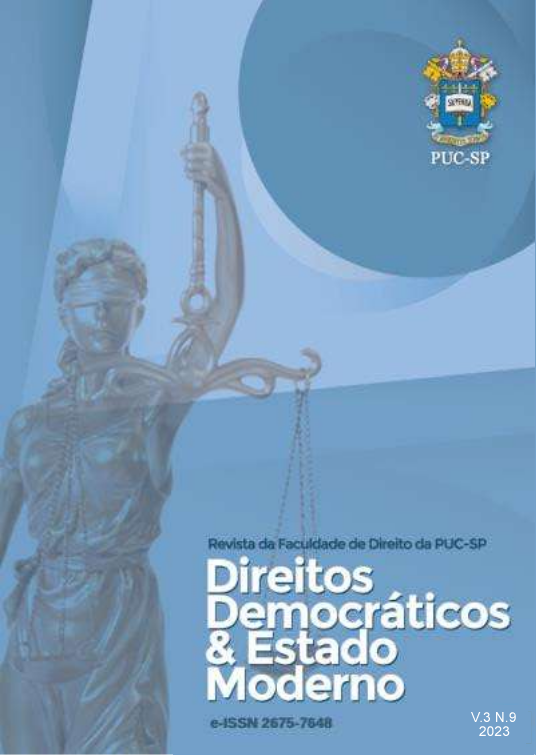The Modern paradigm in the construction of human rights:
Perspective of human rights based on decolonial thinking
DOI:
https://doi.org/10.23925/ddem.v.3.n.9.62750Keywords:
Modernity, Human rights, Decolonial thinking, Critical theoryAbstract
This paper aims to analyze the modernity project that, aligned with the dominant political/economic power, produced a traditional and universal human rights discourse that privileges abstract equality, freedom from the capitalist production logic and an asymmetry of power and exploitation between the periphery and the center of the world. The research proposes to analyze the formation of the individual from the Enlightenment rationalism and the configuration of the modern State, which corresponds, in turn, to a traditional view of human rights. In contrast, from a decolonial perspective, critical theory seeks to understand the dimension of human rights through another rationality, considered as historical processes of struggles, resistance, and resignifications, guided by the bias of freedom and emancipation of the subject in front of the mercantile/capitalist ideology that shaped the entire west. The method used in the research that substantiated the present work was the dialectic, in the senses attributed to dialectics by Plato and Hegel. From Plato, the dialectic as a method of division; of Hegel, the dialectic as a synthesis of opposites.
References
BOBBIO, Norberto. O Positivismo Jurídico: Lições de filosofia do Direito. São Paulo: Ícone, 1995.
BRAGATO, Fernanda Frizo. Para Além do Discurso Eurocêntrico dos Direitos Humanos: contribuições da descolonialidade. In: Revista Novos Estudos Jurídicos - Eletrônica, Vol. 19 -n. 1 - jan-abr 2014.
CASTRO-GÓMEZ, Santiago. Decolonizar la universidad. La hybris del punto cero y el diálogo de saberes: Reflexiones para una diversidad epistémica más allá del capitalismo global, Bogotá: Siglo del Hombre Editores, 2007.
DESCARTES, Rene, Discurso do Método / Lisboa: Edições 70, 2000.
DUSSEL, Enrique. Ética da Libertação: Na idade da globalização e da exclusão. São Paulo: Vozes, 2018.
DUSSEL, Enrique. O encobrimento do outro. São Paulo: Vozes, 1993.
FACHHI, Alessandra. Breve História dos Direitos Humanos. São Paulo: Loyola, 2011.
HOBBES, Thomas. O Leviatã. São Paulo: Nova Cultural, 1999.
HORKHEIMER, Max; ADORNO, Theodor W. Textos Escolhidos. São Paulo: Nova Cultural, 1991.
KANT, Immanuel. Textos Seletos. Petrópolis: Vozes, 1985.
KANT, Immanuel. Crítica da Razão Pura. Lisboa: Fundação Calouste Gulbenkian, 2001
LOCKE, John. Segundo Tratado Sobre o Governo Civil. São Paulo: Abril, 1973. (Coleção Os Pensadores).
LUCAS, Doglas Cesar; SANTOS, André Leonardo Copetti. A (in)diferença no direito. 2.ed. Porto Alegre: Livraria do advogado, 2019.
LUCAS, Doglas Cesar. Direitos Humanos e Interculturalidade: um diálogo entre a igualdade e a diferença. Ijuí: Unijuí, 2010.
MBAYA, Etienne-Richard. Gênese, evolução e universalidade dos direitos humanos frente à diversidade de culturas. ESTUDOS AVANÇADOS 11 (30), 1997.
MILL, John Stuart. Considerações Sobre o Governo Representativo. Brasília: UNB, 1981.
RAWLS, John. Uma Teoria da Justiça. São Paulo: Martins Fontes, 1997.
GONZÁLEZ. Pablo Guadarrama. Democracia y derechos humanos: visión humanista desde América Latina. Bogotá: Taurus, 2016.
MALDONADO-TORRES, Nelson. Sobre la colonialidad del ser: contribuciones al desarrollo de un concepto. Bogotá. Iesco-Pensar-Siglo del Hombre Editores. 2007.
MIGNOLO, Walter D. Colonialidade: O lado mais escuro da modernidade: Revista brasileira de Ciências Sociais. 2016.
WALSH, Catherine. ¿Son posibles unas ciencias sociales/culturales otras? Bogotá, Colômbia: Nómadas, 2007.
PIOVESAN, Flávia. Direitos Humanos. São Paulo: Saraiva, 2006.
QUIJANO, Anibal. A colonialidade do saber: eurocentrismo e ciências sociais. Perspectivas latino-americanas. Buenos Aires: CLACSO, 2005.
Downloads
Published
How to Cite
Issue
Section
License
Copyright (c) 2023 Democratic Rights & Modern State

This work is licensed under a Creative Commons Attribution 4.0 International License.
This work is licensed under a License Creative Commons Atribuição 4.0 Internacional.
The authors grant the journal all copyrights relating to the published works. The concepts issued in signed articles are the absolute and exclusive responsibility of their authors.
DD&EM Magazine - ISSN 2675-7648

















